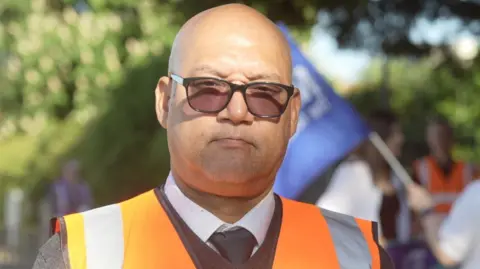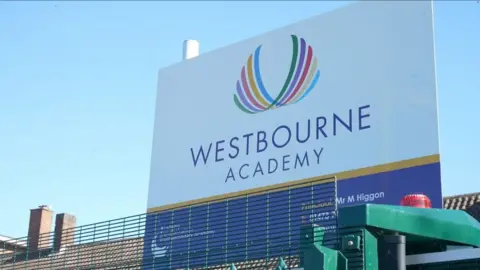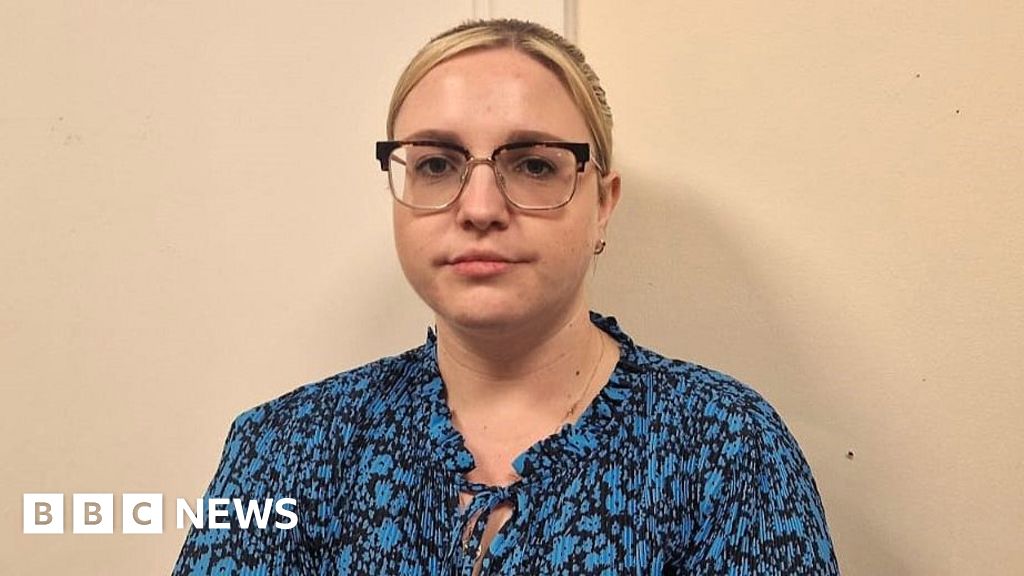BBC News, Suffolk
 Sophie Walker
Sophie WalkerWhen Sophie Walker graduated and became a teacher 10 years ago, she felt excited for the future.
But this week the science teacher walked out on strike with 50 colleagues at her Ipswich school in protest at pupil behaviour.
Teachers at Westbourne Academy are having chairs and scissors thrown at them, and many are struggling with their mental health, Ms Walker says.
Some students are refusing to attend lessons and are disrupting other classes, and even exams, she adds.
“They go and collect other students from classes and roam around in large groups. They come in with no intention of attending any lessons.”
Ms Walker, a representative for the National Education Union (NEU), admits it has made her consider quitting both the school, and teaching altogether.
“I’m only still here because of the students who want to learn. They deserve an education,” she says.
Another teacher, who asked to remain anonymous, says she resigned from the school, which has just over 1,000 pupils, after being pushed by students and sworn at more times than she can remember.
The trust that runs the school acknowledges there is a “small but significant minority whose behaviour does not yet meet our high expectations” and says it is “actively addressing” this.
‘Kicking doors and throwing water’
 Jamie Niblock/BBC
Jamie Niblock/BBCDisruption is not dealt with consistently, according to several teachers, who say there is a lack of support from the senior leadership team.
Marc Emmanuel, who has taught English there for 24 years and is also an NEU representative, says four very experienced teachers have left in the last year.
While it is unusual for teachers to strike over pupil behaviour, he says it is a “last and desperate resort” to get some support.
“Pupils are running down the corridors for up to five hours a day. It can be 30 to 40 of them.
“They’re kicking doors, throwing bottles full of water into classrooms and going into exam rooms and shouting.
“It’s not being adequately dealt with. We want robust systems put in place that are followed through. We need to address this to stop it from spreading further.”
‘They think they don’t have to work hard’
 Luke Deal/BBC
Luke Deal/BBCSocial media and mobile phones play a big part in the poor behaviour at Westbourne Academy, Ms Walker says.
Students are not supposed to have phones in school but she says it is difficult to stop them.
“They see these people on social media making a lot of money and they think they don’t have to work hard,” she says.
“The content they are exposed to doesn’t encourage good behaviour.”
 Sophie Walker
Sophie WalkerThe 31-year-old says she hopes the leadership team can start to communicate better and that staff, including the pastoral team, can be more consistent in handling poor behaviour.
“We got a new principal in September and he is trying hard but things need to change quickly.”
Her mental health has recently been “at an all-time low”, she says.
“I’ve worked hard to get where I am and I don’t want to walk away from the students who want to learn, but I don’t know how much longer I can cope.”
What do parents say?
One mother says smaller issues, such as with school uniform, are punished while bigger ones are often not dealt with.
She says her son was attacked twice outside the school by older students and threatened with a knife.
She was told it was being investigated but heard nothing back, she says.
Yet she claims her other child at the school has been sanctioned for minor breaches of the rules.
One father says he removed his autistic daughter from the school to home educate her after she was bullied and threatened with sexual violence.
“The leadership took no accountability,” he says.
“They said they would do something about it but instead they made my daughter feel like she was in the wrong by putting her in a room on her own to learn.
“They let the perpetrator get away with it.”
 Zoie O’Brien/BBC
Zoie O’Brien/BBCSome parents say they have lost all faith in the school. One father says the best teachers have left, with more due to leave in September.
“It’s absolutely diabolical. Relationships have broken down between teachers and students and the strike will not help build back trust,” he says.
“I have decided to move my daughter, who has special educational needs, to another school. She has been suspended several times for verbally lashing out but she can’t regulate herself in that environment.”
He says he disagrees with the strike, finding it unfair that teachers are allowed to walk out while he would be fined if he took his children out of school.
‘I don’t blame the teachers’
But other parents say they support the action and hope it leads to improved behaviour.
Rebecca, 40, whose daughter attends the school, says she is “fully behind” the strike.
“We had a period where she wouldn’t go to her class because behaviour was so bad but she’s happy going in now and that’s all we can ask for,” she says.
“I don’t blame the teachers for going on strike. They shouldn’t be getting abused. Parents need to work alongside them to improve behaviour.
“These pupils are pushing boundaries with how far they can push these teachers and it’s not fair on those that want to learn.”
 Luke Deal/BBC
Luke Deal/BBCSome parents say they were shocked when the school was rated as “good” by Ofsted last summer.
Inspectors noted the school “has not ensured that some pupils behave well enough around the school site and to a much lesser extent in lessons”.
But they said the Academy Transformation Trust, which runs the school, had taken “decisive action” to address “unacceptable standards of behaviour and internal truancy”.
‘Behaviour in schools has deteriorated’

Vic Goddard, who featured on TV show Educating Essex and runs a multi-academy trust of six schools in the county, says behaviour has declined in schools since the Covid pandemic.
An increasing number of young people get into a “spiral of behaviour”, he says.
“As school leaders, our job is to support teachers to manage behaviour while allowing others to continue to learn, and that’s where the battle is.”
He points out that current Year 9 and 10 students missed the start of Key Stage Two in primary school and were affected by the closure of Sure Start centres.
He believes funding cuts to schools are also having an impact on behaviour.
“Once you’ve recruited, you’ve got to retain. Because the only way you can improve your school is by keeping people in it,” he says.
What do the school and the Department for Education say?
 Zoie O’Brien/BBC
Zoie O’Brien/BBCIn a statement, the trust says it takes the wellbeing of staff seriously, and supports their “desire to teach in disruption-free classrooms”.
Many parents are happy with the education, it adds, and says the trust is providing assistance to improve special educational needs and disabilities (Send) provision and pastoral support.
“The majority of pupils at Westbourne behave well, are respectful, and want to learn,” it says.
“But we acknowledge there is a small but significant minority whose behaviour does not yet meet our high expectations. We are actively addressing this.
“We encourage any parent who feels unheard to get in touch directly — we want to work together to ensure every child at Westbourne thrives.”
A Department for Education spokesperson says it is “committed to turning the tide on poor behaviour” and that new regional improvement teams will work with schools to improve standards.
Note:- (Not all news on the site expresses the point of view of the site, but we transmit this news automatically and translate it through programmatic technology on the site and not from a human editor. The content is auto-generated from a syndicated feed.))




